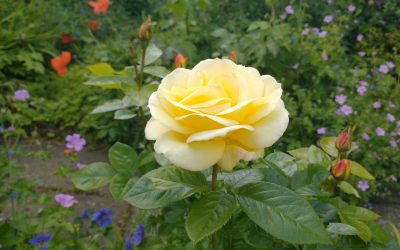Readers who followed my enthusiastic recommendation of ‘The Real Charlotte’ may be interested in another recommendation from the same period. I’ve just finished reading ‘Maurice Guest’, published in 1908 by Henry Handel Richardson, the pseudonym of Ethel Richardson, an Australian novelist. It’s a book I’ve been trying to find for ages, because from time to time it’s mentioned as a forgotten classic about musicians, but I only managed to track it down recently.
‘Maurice Guest’ is a long study of a young English pianist who goes to study in Leipzig in the 1890s (as Ethel Richardson did herself when she was an aspiring pianist). Leipzig at the time was full of music students and their well-known professors, whose adherents gathered in coffee houses to compare their teaching methods and speculate about the future glory of their star pupils. As there were no ‘halls of residence’, each student lodges with a landlady somewhere in town, so the book is full of students hurrying from cobbled street to cobbled street to visit one another and persuade their landladies to warm them up a cup of coffee. All the townspeople are aware of which professors are ‘in the ascendant’ and whose pupils are struggling for the limelight, and they gather at regular ‘house concerts’ to keep track of who’s playing what and how. Students burst in on another’s lodgings to say things like, ‘I’ve got to tell you! Schwarz is letting me play the C minor Beethoven next term.’ It made me feel rather nostalgic for an atmosphere I’ve never really experienced.
The hero of the novel is smitten by love for a fellow piano student, a fascinating ‘dark lady’ named Louise Dufrayer, who is Australian (like the author) and possessed of a haunting beauty. Maurice’s feelings for Louise gradually take centre stage, push music to the margins and bring out a dark side of his nature. Louise, naturally, loves Another, a red-haired violinist who is morally despicable and unfairly gifted. I started reading for a description of musical Leipzig, but became fascinated by the brilliant way Richardson charts Maurice Guest’s descent into obsessive, irrational love, for which he sacrifices everything. The detailed descriptions of many scenes between Maurice and Louise – especially when things start to go wrong – rang so true that I felt sure the author was drawing on her own experience of life in Leipzig. It’s a tour de force of psychological insight, beautifully written and one of the most gripping novels I’ve read for a while.




Yes! I read this as a student and was so gripped by Maurice’s dilemma I sat up all night to finish it!
Richardson’s time in Leipzig overlapped with that of the Australian composer Alfred Hill, who studied there and played violin with the Gewandhaus Orchestra. I wonder if they knew one another, and if any character in her novel is based on him.
Hill was later famous in Australia for his symphonies, which are Schummanesque in style. His student and second wife Mirrie Hill is still known to every young Australian pianist for her compositions aimed at students.
Further to my comment: The Australian Dictionary of Biography says that Richardson studied in Leipzig alongside her sister Lilian, and Hill studied there alongside his brother John. It is hard to believe that two sets of Australian siblings in the same German city studying music at the same time would not have known each other.
http://adb.anu.edu.au/biography/richardson-ethel-florence-henry-handel-8202
http://adb.anu.edu.au/biography/hill-alfred-francis-6667